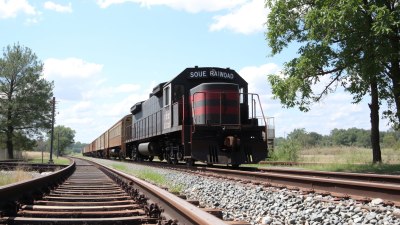Why History Feels Different When You Experience It in Person
Exploring the transformative power of firsthand history experiences and their emotional impact.

Image by lookstudio on Freepik
History is often viewed through the lens of textbooks and documentaries, where dates and figures seem to dance on the page, but when one steps into the actual spaces where history unfolded, a profound shift occurs. Experiencing history in person allows us not only to witness but also to feel the weight of events that have shaped civilizations, cultures, and societies. It brings abstract concepts into tangible realities and leaves a lasting impression almost impossible to replicate through mere reading.
The Power of Place
Visiting historical sites—whether it’s the ruins of ancient civilizations, the streets of cities pivotal in momentous events, or memorials dedicated to wars and struggles—can evoke an emotional response that is deeply personal. Standing in the same place where significant decisions were made or where battles were fought transforms history from a distant occurrence into something immediate and relevant.
Connecting to the Past
When you walk through the Colosseum in Rome, breathe in the air around you in the historical center of Athens, or gaze at the walls of a Civil Rights landmark like the Edmund Pettus Bridge, you can almost hear the echoes of voices from the past. Your surroundings resonate with stories, and suddenly, historical figures are not just characters in a book; they become real people who lived and breathed in the very spaces you occupy. This sense of connection bridges time and makes the struggles, triumphs, and everyday lives of those who came before you more relatable.
Immersive Learning
Experiencing history in person is not just a sentimental journey; it is an immersive learning experience. The sights, sounds, and even smells of a historical site create a full sensory experience that reinforces what you learn. For example, visiting a battlefield can give insight into the strategies used in conflict; the terrain, the climate, and the sheer scale of the site provide context that a textbook can only hint at.
Emotion and Memory
Studies have shown that emotions play a crucial role in how we remember information. Experiencing history firsthand can elicit strong emotions—pride, sorrow, reverence—that help cement the events in our minds. The visceral reaction you have when reading about the Holocaust at Auschwitz, or the excitement felt at the site of a major cultural or technological achievement, can lead to deeper understanding and retention of that information.
Personal Reflection
On occasion, experiencing history in person prompts personal reflection and introspection. It can challenge your beliefs and perceptions, leading to a greater understanding of your own place within the continuum of history. Being present at a historic event, for instance, can inspire conversations about current societal issues, prompting individuals to think critically about the past's impact on the present and future.
Bringing History to Life
History isn't just about dates and events; it's about the lives intertwined within those moments. Museums and various cultural institutions play a vital role in bringing history to life through exhibits, interactive displays, and guided tours. The inclusion of artifacts, personal stories, and multimedia presentations helps to create a comprehensive picture that engages visitors on multiple levels. Engaging with knowledgeable guides who can share stories and answer questions facilitates an enriching experience that leaves a lasting impact.
The Role of Stories
Every historical site is filled with stories waiting to be uncovered. When you hear firsthand accounts from historians, local guides, or even through multimedia available at such sites, those narratives stitch together the fabric of history. The stories imparted create a sense of belonging, reminding visitors that they are part of something larger than themselves. The collective history of humanity is enriched by the infinite unique experiences of individuals.
Shaping Cultural Identity
Experiencing history in person can also forge a strong connection to cultural identity. For many, visiting significant sites can evoke feelings of national pride or cultural heritage. Individuals traveling to places like Ellis Island or the Great Wall of China may feel a renewed sense of belonging to their roots, while indigenous peoples visiting sacred sites can connect deeply to their ancestry and traditions.
Transformative Travel
Traveling to historical destinations can be a transformative experience. Connecting with different cultures and histories can inspire empathy, broaden perspectives, and foster a sense of global citizenship. As travelers learn about the complexity of historical narratives, they gain a deeper appreciation for the diverse tapestry of human experiences that shape the world today.
A Different Perspective
History experienced in person also allows for the possibility of seeing past narratives in a new light. When standing on contested grounds or visiting places with conflicting histories, individuals can engage in dialogues about how history is interpreted and remembered. This critical thinking fosters awareness of historical bias and its implications on contemporary society.
Continuing the Legacy
Experiencing history firsthand can ignite a passion for preserving that history for future generations. Many individuals return from historical sites with a newfound commitment to advocacy and education. Whether through writing, teaching, or activism, the impact of personal experiences can drive efforts to safeguard the stories and lessons learned from the past, ensuring they remain relevant for years to come.
Bridging Generations
Bringing the younger generation to experience history in person is vital in fostering respect for the past. Ideally, these visits should be intergenerational, where grandparents, parents, and children share stories, perspectives, and lessons learned while walking together through time. Such moments foster bonding, allowing for dialogues that help shape understanding and appreciation for one’s heritage.
A Call to Action
The next time you think of history, challenge yourself to step outside the confines of textbooks and documentaries. Seek out the places that have shaped our world, and engage with the stories waiting to be told. Visit historic sites, participate in local events, or attend lectures that invite dialogue about the past. Not only will this enhance your understanding of history, but you’ll likely find it leads to crucial conversations about our present and future. History is alive, and it is waiting for those brave enough to step into it—feet first.











